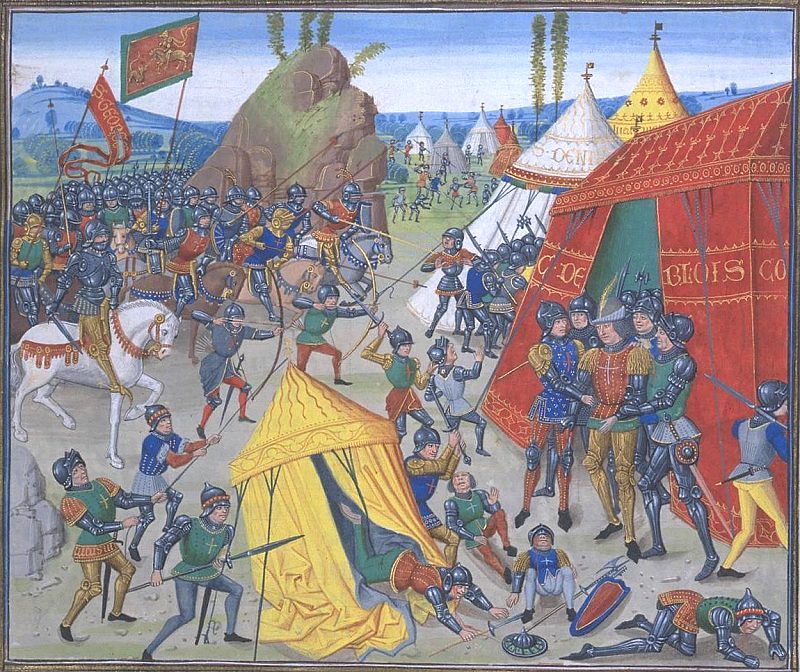My rating: 3 of 5 stars
Without a doubt Bernard Cornwell can write battle scenes with great detail, but in Vagabond, book 2 of the Grail Quest, I feel there’s too much of it. Two great battles serve as bookends. Come to think of it, in Harlequin there are also two, so why did I enjoy that book more than this one?
For one, that first battle in the book 1 of the Grail Quest was a siege. As a siege there is no big inferno that would block out any character movement or growth. Soldiers wait in a siege for months; occasionally they would attack just to see if the wall is still standing.
That siege happened just a little after the massacre in Hookton which drove Thomas to sign up for the English army invading France. Story wise, I can pick Thomas out from the crowd as they say.
He was an up and coming star in the Army under Will Skeat, so as a reader you are caught up in only his growth. One by one he bumps into men of title leading the siege until eventually his plan rises on top, eventually used to winning the La Roche-Derrien. The walls of the La Roche-Derrien surrounded by the English army are only second in importance.
For one, that first battle in the book 1 of the Grail Quest was a siege. As a siege there is no big inferno that would block out any character movement or growth. Soldiers wait in a siege for months; occasionally they would attack just to see if the wall is still standing.
That siege happened just a little after the massacre in Hookton which drove Thomas to sign up for the English army invading France. Story wise, I can pick Thomas out from the crowd as they say.
He was an up and coming star in the Army under Will Skeat, so as a reader you are caught up in only his growth. One by one he bumps into men of title leading the siege until eventually his plan rises on top, eventually used to winning the La Roche-Derrien. The walls of the La Roche-Derrien surrounded by the English army are only second in importance.
In Vagabond, emotional as battles can be, the narrative emotion stops. I’m not as emotionally aware where Thomas is if I care at all.
Battles are about the field, the formation, what types or soldiers are placed where, the movement. There’s also the ebb and flow, sometimes one side looks like it is winning, and then after adjustment the other side is able to fight back. Always the appreciation of the battle is the bigger picture, keeping that map in mind. Point is, as far as story telling is concerned, I have been jarred out of Thomas’ headspace. Battles are not about individuals.
I think Cornwell approached the Grail Quest as a tour of the entire campaign of King Edward III against France, from the fields of Brittany to Calais to the borders of Scotland, with Thomas the Archer as the tourist.
It can be argued that at the forefront of the story is the super soldier of the times, the archer, and with it the social upheavals between classes: the moneyed armored knights and the everyday man who can pick up a longbow. Following the story of the English archer – not just Thomas – is the fate of two countries in England and France who are the epitome of the battling war philosophies: archers versus knights.
The Grail, which what this series is named after, and the mysterious Vexille family who have long been connected with the legends of the Grail, come in ironically at a distant third.
Hell, even at book 2, Thomas is still confused or not that interested with finding, for lack of a better term, his family heirloom. He is as I said a tourist pulled into many theaters in this Edward IIIs so far triumphant stint in the Hundred Years War. So, on that point, at least from the point of expectation Book 2 is a disappointment.
The atmosphere of the Holy Grail needs more religion and mystery than he’s setting up. It could be a bad case of marketing or a poor choice of a macguffin. Bernard Cornwell description of the political and military situation is just that great. Having read only my second series of him – Warlord Chronicles being the first – politics and the army seems to be more his forte.


No comments:
Post a Comment